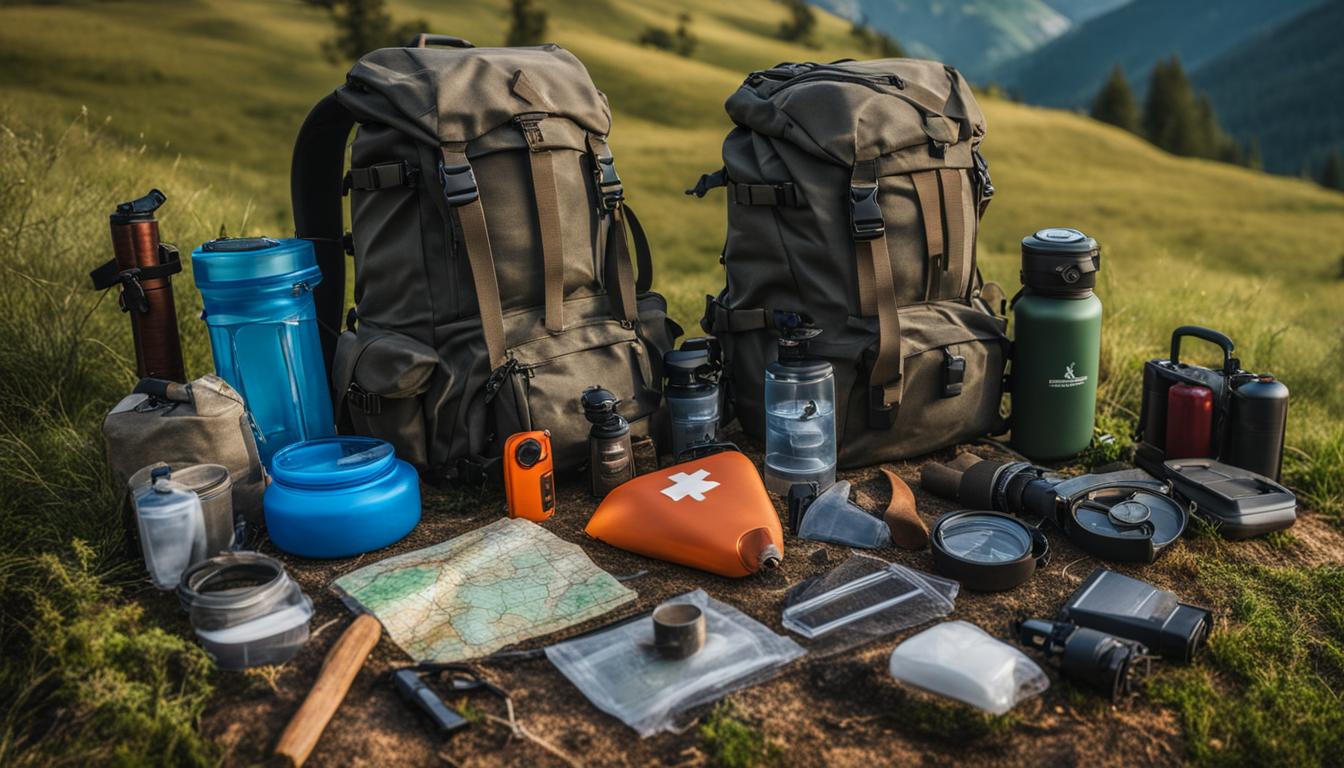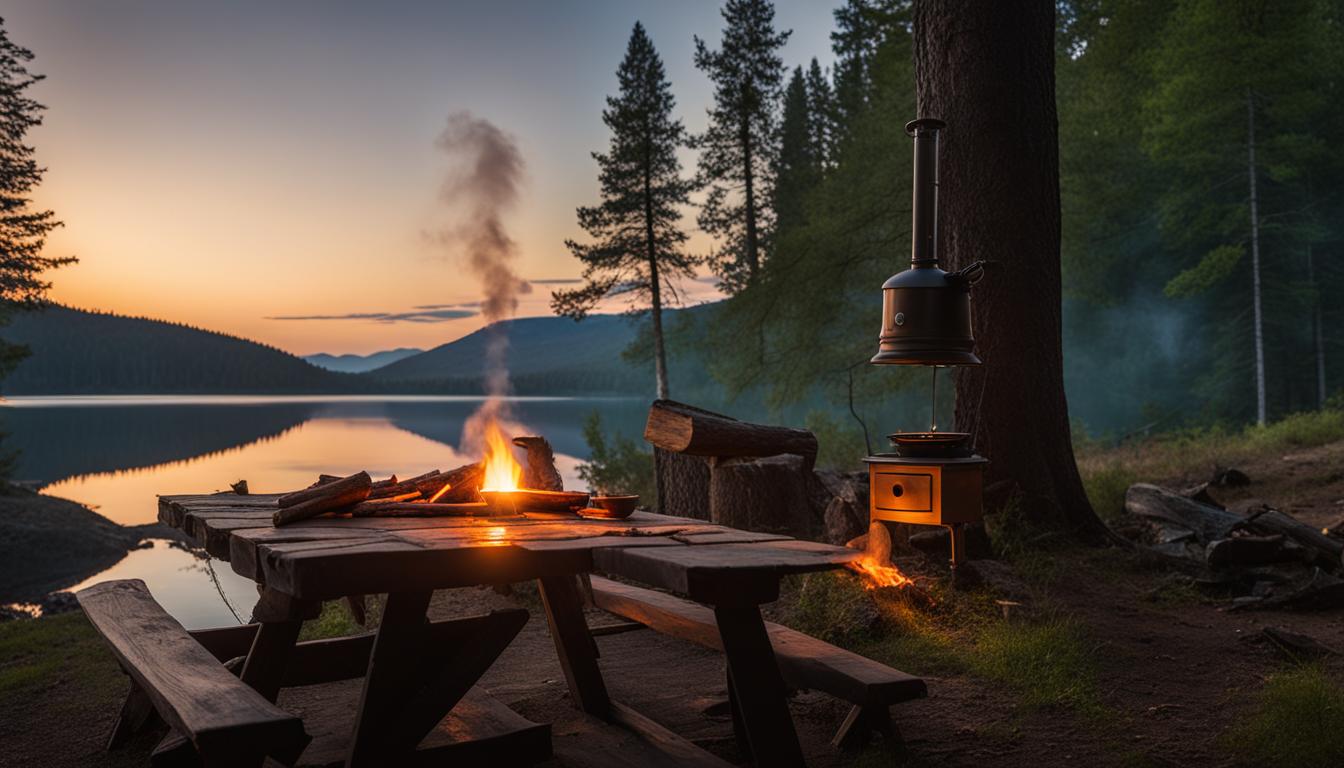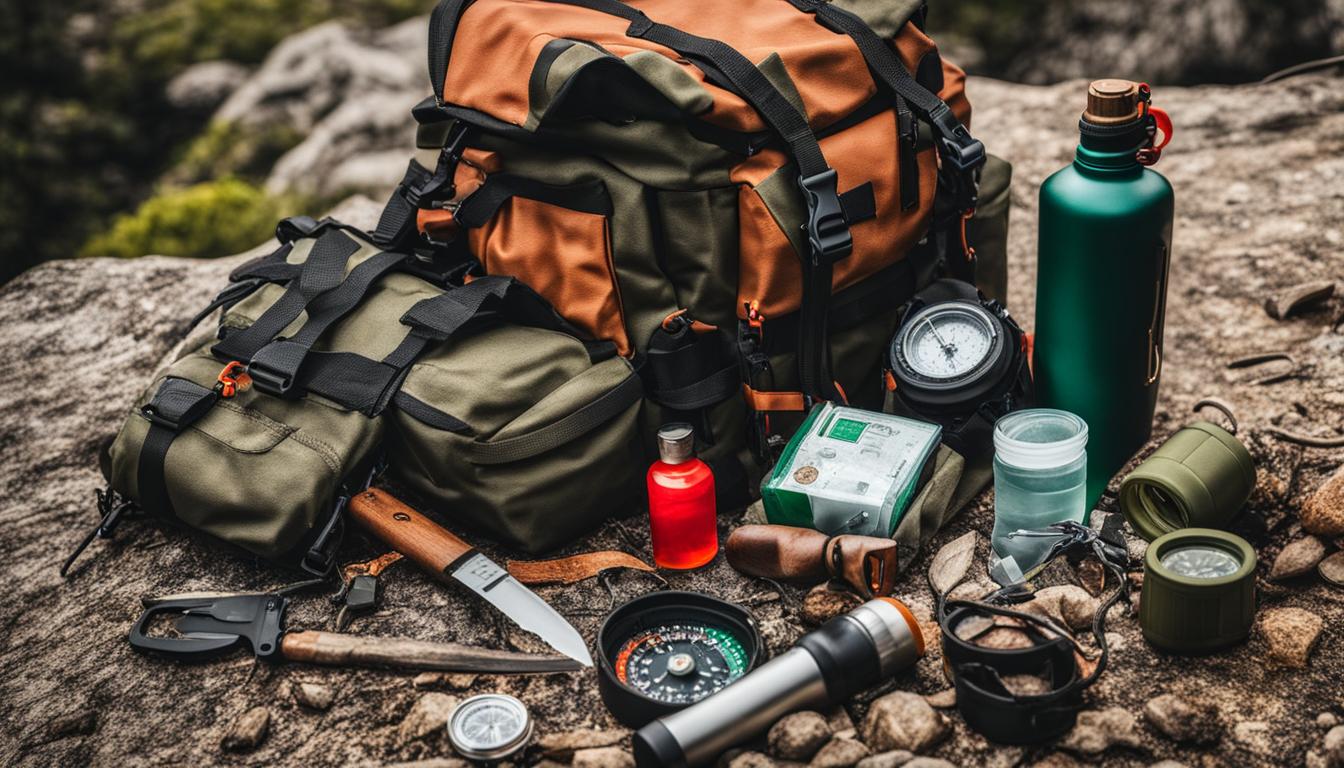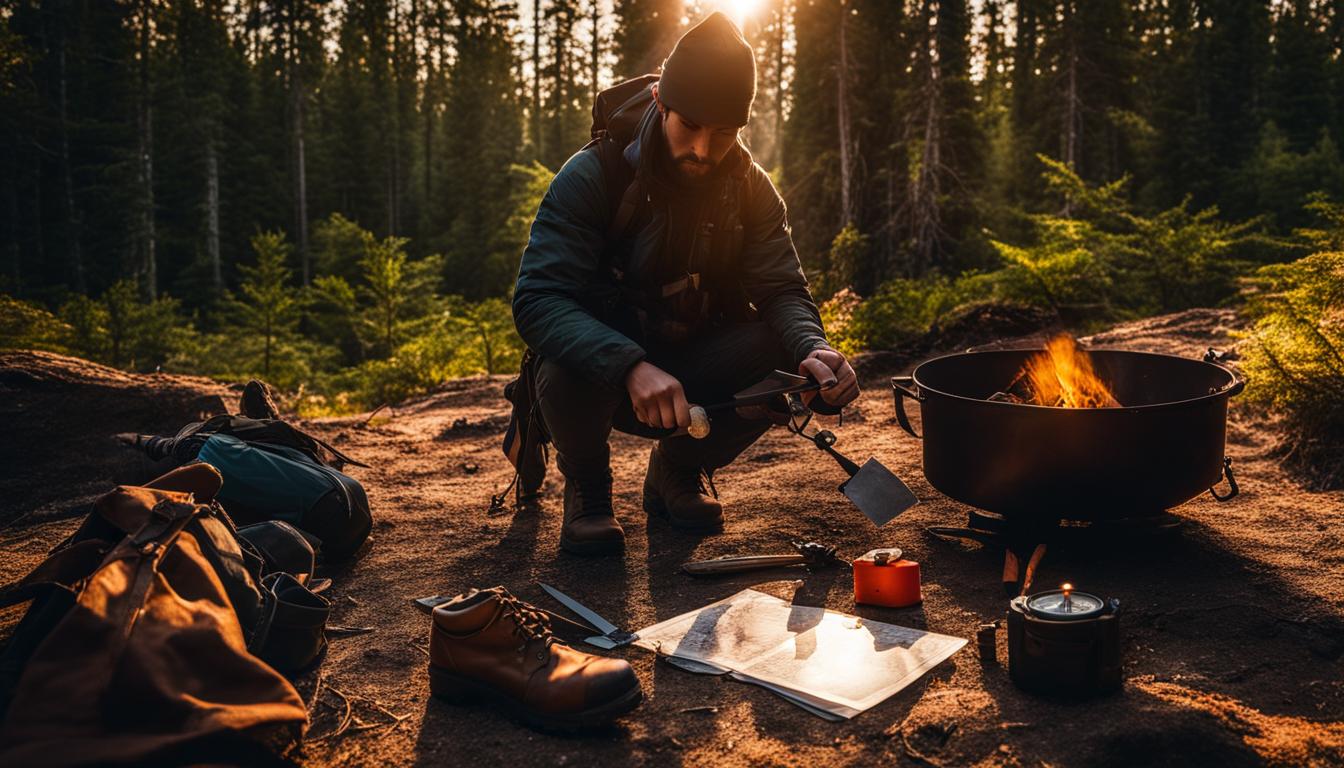Welcome to our in-depth guide on survivalist camping, where we will delve into this thrilling outdoor activity. Survivalist camping integrates traditional camping with crucial survival techniques, providing a distinct and thrilling experience for nature lovers. Whether you are an experienced survivalist or a novice seeking to learn new skills, this guide will equip you with the essential knowledge to excel in the great outdoors.
Key Takeaways:
- Survivalist camping combines camping with essential survival skills.
- It offers a unique and thrilling outdoor experience for outdoor enthusiasts.
- Mastering survival skills is crucial for self-sufficiency and survival in the wilderness.
- Packing the right gear ensures safety and comfort during survivalist camping.
- Survivalist camping challenges individuals both physically and mentally, promoting personal growth and resilience.
What is Survivalist Camping?
Survivalist camping, also known as wilderness camping or bushcraft camping, is a type of camping that takes outdoor enthusiasts beyond traditional camping experiences. It goes beyond the typical camping trip by immersing campers in nature and challenging them to rely on essential survival skills and minimal gear. Survivalist camping emphasizes self-sufficiency, resourcefulness, and an appreciation for the natural world.
In survivalist camping, campers learn and practice outdoor survival techniques such as fire starting, shelter building, water sourcing and purification, navigation, and foraging for food. They also develop skills in hunting, trapping, knot tying, and tool usage. These skills are important for self-sufficiency and thriving in the wilderness, where campers may be faced with unexpected challenges.
Survivalist camping provides a unique and exhilarating outdoor adventure that allows individuals to test their physical and mental limits, while also fostering a deeper connection with nature. It offers an opportunity to escape the modern comforts of everyday life and embrace a more primitive way of existence, relying on one’s own skills and resourcefulness. Whether you are a seasoned survivalist or a beginner, this type of camping can provide you with a thrilling and unforgettable experience.
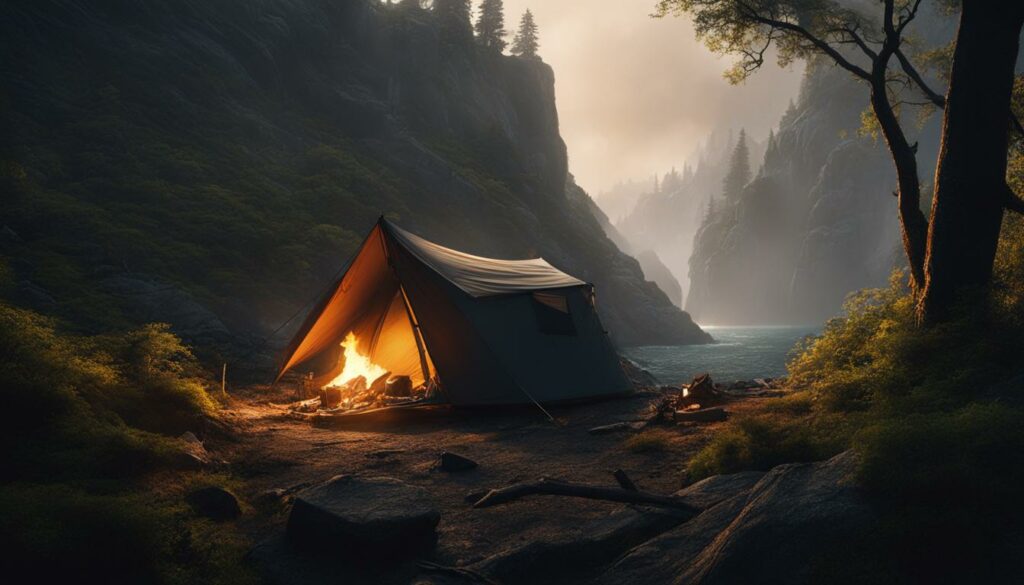
Why Choose Survivalist Camping?
Survivalist camping is chosen by outdoor enthusiasts for various reasons. It offers a unique challenge and adventure that pushes individuals to embrace their inner strength and resilience. It provides an opportunity for personal growth and self-discovery as campers learn and develop essential survival skills. The experience of relying on oneself and the natural environment fosters a deeper bond with nature and a sense of connection to the earth.
Moreover, survivalist camping can also be a time of bonding and team building for groups or families who embark on the adventure together. It requires teamwork, communication, and cooperation to successfully navigate and overcome the challenges of the wilderness. By working together, campers learn to trust and rely on one another, fostering stronger relationships and creating lifelong memories.
In summary, survivalist camping offers an exciting and challenging outdoor experience that combines camping with essential survival skills. It allows individuals to connect with nature, develop self-sufficiency, and foster personal growth and resilience. Whether you are seeking adventure, personal development, or simply a break from the modern world, survivalist camping can provide a unique and rewarding experience.
Basic Skills for Survivalist Camping
Survivalist camping requires a range of essential skills to thrive in the wilderness. These skills are crucial for self-sufficiency and survival in the great outdoors. Here are some of the basic skills that every survivalist camper should master:
- Fire Starting Techniques: Knowing various fire starting methods, such as using flint and steel, friction-based techniques, or portable fire starters, is essential for warmth, cooking, and signaling for help.
- Shelter Building: Understanding how to construct temporary shelters using natural materials or portable tents is vital for protection against the elements.
- Water Sourcing and Purification: Knowing how to find and collect water from natural sources like rivers, lakes, or rain, and purifying it through boiling, chemical treatment, or filtration methods is crucial for hydration and preventing waterborne illnesses.
- Navigation: Having the ability to read maps, use a compass, and navigate using natural landmarks or the stars is important for staying on course and avoiding getting lost.
- Wilderness First Aid: Learning basic first aid techniques and carrying a well-stocked first aid kit can be lifesaving in emergency situations.
In addition to these skills, survivalist campers should also be knowledgeable in foraging and identifying edible plants, hunting and trapping, building and using tools, knot tying, and improvisation and adaptability. These skills provide campers with the ability to procure food, create useful tools, and solve problems that may arise during their wilderness adventures.
By mastering these basic skills, survivalist campers can confidently navigate and survive in the great outdoors, ensuring an unforgettable camping experience.
| Basic Skills for Survivalist Camping |
|---|
| Fire Starting Techniques |
| Shelter Building |
| Water Sourcing and Purification |
| Navigation |
| Wilderness First Aid |
Packing the Right Gear
When embarking on a survivalist camping adventure, it’s crucial to pack the right gear to ensure your safety and comfort in the wilderness. While survivalist camping emphasizes minimalism, having the essential equipment can make all the difference. Here are some must-have items for your survivalist camping gear:
- Backpack: A durable backpack is essential for carrying all your gear and supplies.
- Tent or tarp: A reliable shelter is crucial for protection from the elements.
- Sleeping bag and mat: Stay warm and comfortable during the night with a quality sleeping bag and mat.
- Multi-tool: A versatile tool that can be used for various tasks such as cutting, opening cans, and repairing equipment.
- Firestarter: Ensure you can start a fire easily with waterproof matches or a firestarter kit.
- Water container: Stay hydrated by carrying a water container or a water purification system.
- Cooking equipment: Pack lightweight and compact cooking equipment for preparing meals.
- First aid kit: Be prepared for any minor injuries or medical emergencies.
- Headlamp or flashlight: Stay safe and navigate in the dark with a reliable light source.
- Navigation tools: Carry a compass, map, or GPS device to help you find your way.
- Food and snacks: Pack lightweight and high-energy food options to sustain you during your adventure.
- Appropriate clothing: Dress in layers and bring appropriate clothing for various weather conditions.
By packing these essential items, you’ll be well-prepared for any situation that may arise during your survivalist camping journey.

Why Do People Go Survivalist Camping?
Survivalist camping is not for the faint of heart. It challenges individuals both physically and mentally, offering a unique and thrilling outdoor experience. So why do people choose survivalist camping? Let’s explore some of the reasons:
- Personal Growth and Resilience: Survivalist camping pushes campers out of their comfort zones and forces them to confront difficult situations. This fosters personal growth, resilience, and the ability to adapt to unforeseen circumstances.
- Bonding and Team Building: Surviving in the wilderness requires cooperation and teamwork. Survivalist camping provides an opportunity for individuals to bond with others while facing challenges together, fostering strong relationships and teamwork skills.
- Connection with Nature: In today’s fast-paced world, many people crave a deeper connection with nature. Survivalist camping offers a chance to immerse oneself in the natural world, appreciating its beauty and gaining a greater understanding of our place within it.
- Self-Sufficiency and Independence: Survivalist camping promotes self-sufficiency and independence. By relying on essential survival skills and minimal gear, campers learn to trust their own abilities and resourcefulness, enhancing their self-confidence and self-reliance.
Whether it’s the thrill of adventure, the desire for personal growth, or the longing for a stronger connection with nature, survivalist camping attracts individuals seeking a unique and challenging outdoor experience. It offers an escape from the ordinary and a chance to test one’s limits, ultimately leading to personal growth and a deeper appreciation for the natural world.
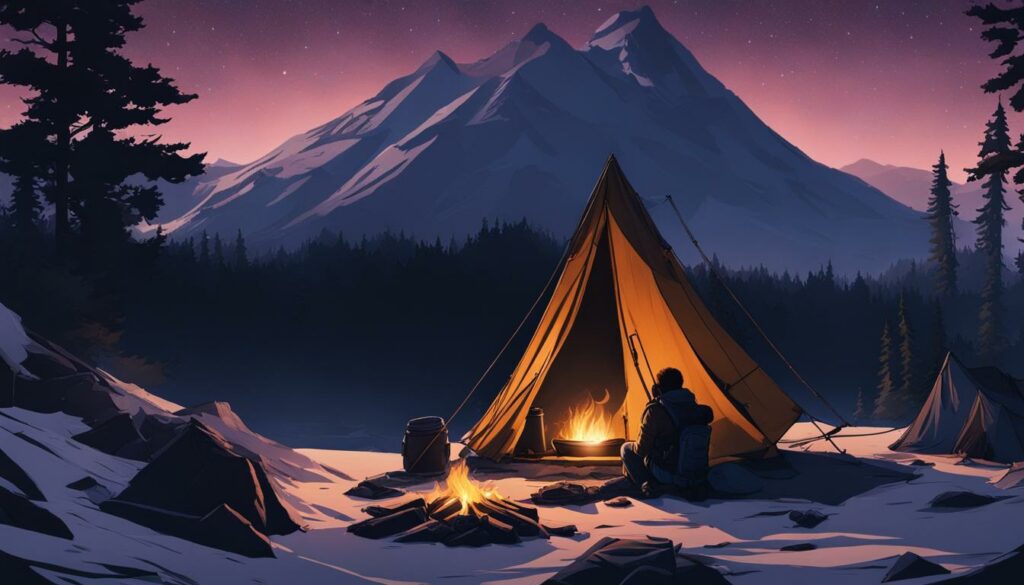
Testimonials from Survivalist Campers
“Survivalist camping taught me how to be more self-reliant and resourceful. It challenged me in ways I never thought possible and showed me what I’m truly capable of.” – Sarah, avid survivalist camper
“Going survivalist camping with my friends was an incredible bonding experience. We faced challenges together, relied on each other’s skills, and came out stronger as a team.” – Mike, survivalist camping enthusiast
Tips for a Successful Survivalist Camping Trip
- Prepare physically and mentally by building your endurance and practicing essential survival skills.
- Research the location thoroughly to understand the terrain, wildlife, and potential challenges you may face.
- Pack the right gear, including a well-stocked camping survival kit and appropriate clothing for the weather conditions.
- Stay hydrated and nourished by carrying enough water and packing lightweight, high-energy snacks.
- Follow Leave No Trace principles to minimize your impact on the environment and preserve the wilderness for future generations.
By considering these tips and embracing the challenges and rewards of survivalist camping, you can embark on an unforgettable adventure that will leave you with lasting memories and valuable life skills.
Choosing the Right Location
When it comes to survivalist camping, choosing the right location is crucial for a safe and enjoyable experience. There are several factors to consider when selecting a camping site that aligns with your goals and preferences. By taking these factors into account, you can ensure that you have access to the necessary resources and a suitable environment for your survivalist camping adventure.
Factors to Consider
1. Local regulations and permits: Before embarking on your survivalist camping trip, make sure to research and comply with any local regulations or permit requirements. This will help you avoid any legal issues and ensure that you are camping in a permitted area.
2. Accessibility: Consider how easily accessible the camping site is. Will you need to hike or drive for a long distance? Is the site accessible by vehicle or only by foot? Assessing the accessibility will help in planning and preparing for your camping trip.
3. Terrain and environment: Take into account the terrain and environment of the camping site. Is it a mountainside, a forest, or a coastal area? Understanding the terrain will help you prepare for potential challenges and adapt your survival skills accordingly.
4. Water sources: Access to clean water is essential for survivalist camping. Check for nearby water sources such as rivers, lakes, or streams. Consider the availability of drinking water and how you will collect, purify, and store it during your camping trip.
5. Wildlife presence: Be aware of the wildlife that inhabits the camping area. Research any potential risks or encounters with animals, and take appropriate precautions. This includes storing food securely to prevent attracting wildlife to your campsite.
6. Safety considerations: Prioritize your safety by considering any potential hazards or risks in the camping area. Take note of any extreme weather conditions, potential natural disasters, or other safety concerns that may impact your camping experience.
| Factors to Consider | Questions to Ask |
|---|---|
| Local regulations and permits | Are there any permits required for camping in the area? Are there any restrictions or regulations? |
| Accessibility | How will you access the camping site? Is it a long hike or a drive? Can you reach the site by vehicle? |
| Terrain and environment | What is the terrain like? Is it a mountainous area, a forest, or a coastal region? |
| Water sources | Are there any nearby water sources such as rivers, lakes, or streams? How will you collect and purify water? |
| Wildlife presence | What wildlife is present in the camping area? Are there any potential risks or encounters to be aware of? |
| Safety considerations | Are there any potential hazards or risks in the camping area? How will you ensure your safety during the trip? |
By carefully considering these factors and conducting thorough research, you can select a camping location that meets your needs and ensures a memorable survivalist camping experience.
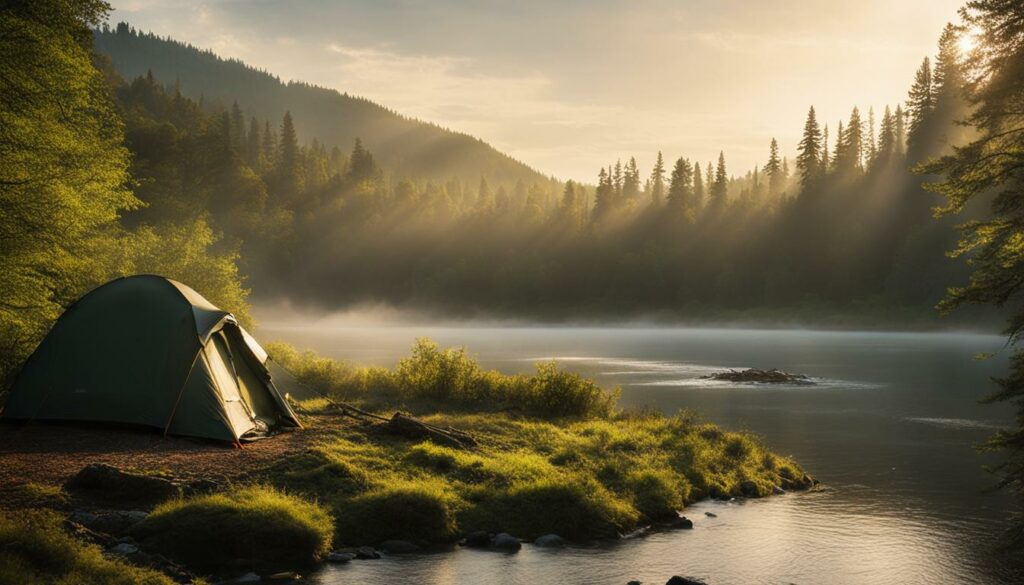
Practicing Leave No Trace Principles
When engaging in survivalist camping, it is essential to practice Leave No Trace principles. These principles focus on minimizing our impact on the environment and preserving the wilderness for future generations. By following these guidelines, we can ensure that our camping experience is both enjoyable and ecologically responsible.
The seven Leave No Trace principles include:
- Plan ahead and prepare: Research and prepare for your trip to minimize unexpected situations and the need for additional resources.
- Travel and camp on durable surfaces: Set up camp on surfaces such as rock, gravel, or established campsites to minimize damage to vegetation.
- Dispose of waste properly: Pack out all trash and waste, including human waste, following the proper methods of disposal.
- Leave what you find: Preserve the natural environment by not disturbing or removing any natural features, plants, or artifacts.
- Minimize campfire impacts: Follow local regulations and guidelines for campfire use and ensure you leave no trace of your fire.
- Respect wildlife: Observe wildlife from a distance, avoid feeding them, and keep your food and trash properly stored to prevent attracting animals.
- Be considerate of other visitors: Respect other campers’ privacy and enjoyment of the wilderness by keeping noise levels low and minimizing your impact on shared spaces.
By adhering to these principles, we can protect the natural beauty of our surroundings and create a positive impact on the environment while enjoying our survivalist camping adventures.
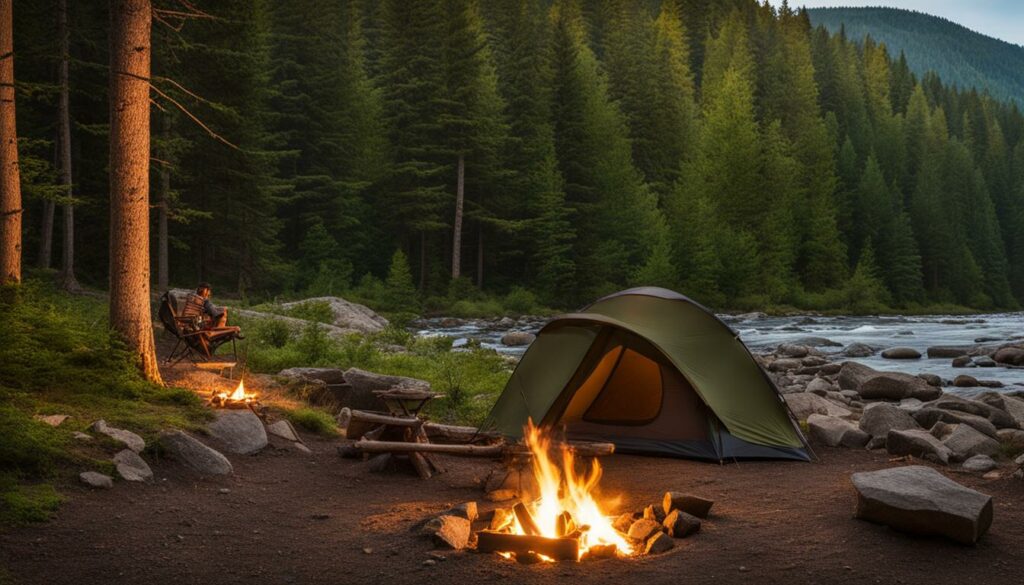
The Importance of Knowledge and Preparation in Survivalist Camping
In the world of survivalist camping, knowledge and preparation are the keys to a successful and enjoyable outdoor adventure. Whether you’re a seasoned survivalist or a beginner, understanding the terrain, wildlife, and essential survival skills for your specific environment is crucial. By equipping yourself with the right knowledge and preparing adequately, you can increase your chances of survival and ensure a safe and unforgettable experience.
One of the most important aspects of knowledge in survivalist camping is understanding the local flora and fauna. Learning about edible plants and their identification can provide you with a valuable food source in the wilderness. Additionally, understanding the behavior and habits of wildlife can help you avoid dangerous encounters and navigate their territories safely.
Preparation also plays a vital role in survivalist camping. Having a well-stocked camping survival kit with essential gear and food supplies is crucial for emergency situations. This includes items such as a multi-tool, firestarter, water container, first aid kit, and appropriate clothing. Being properly equipped ensures that you have the necessary tools to handle any unexpected challenges or emergencies that may arise.
| Knowledge | Preparation |
|---|---|
| Understanding local flora and fauna | Well-stocked camping survival kit |
| Identifying edible plants | Essential gear such as a multi-tool and firestarter |
| Awareness of wildlife behavior | Water container and first aid kit |
| Appropriate clothing for various weather conditions |
Knowledge and preparation are the foundations of survivalist camping. When you have a deep understanding of your surroundings and are well-prepared with the necessary gear and supplies, you can confidently embark on your outdoor adventure and tackle any challenges that come your way.
Remember, survivalist camping is not just about experiencing the thrill of the wild. It is about learning to rely on your skills, knowledge, and preparedness to thrive in any situation. So, equip yourself with knowledge, prepare diligently, and embark on an unforgettable survivalist camping journey.
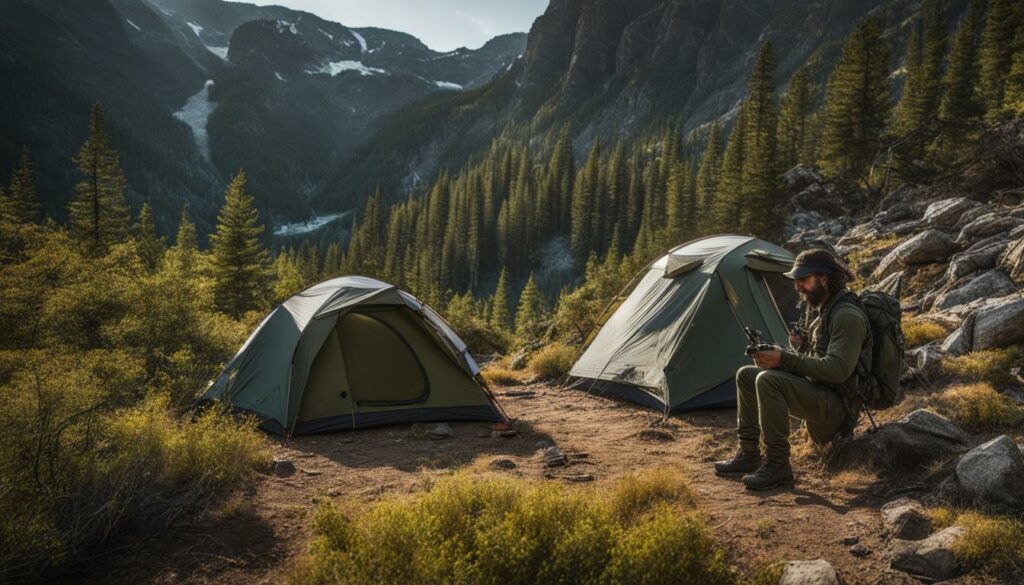
Conclusion
Survivalist camping is an exciting and rewarding outdoor activity that combines the thrill of camping with essential survival skills. By mastering skills such as fire starting, shelter building, and navigation, campers can confidently explore the wilderness and enjoy a safe and unforgettable adventure.
Having the right camping gear for survivalists is crucial for a successful survivalist camping trip. From backpacks and tents to firestarters and navigation tools, packing the right gear ensures that you are prepared for any situation that may arise. It’s important to invest in high-quality equipment that is durable and reliable.
Survival skills for camping play a critical role in survivalist camping. Learning how to start a fire, build a shelter, find and purify water, and navigate through the wilderness are all essential skills for self-sufficiency and independence. By acquiring these skills, campers can confidently face challenges and thrive in the wilderness.
Wilderness survival camping tips are invaluable for anyone embarking on a survivalist camping adventure. From understanding the local environment and wildlife to practicing Leave No Trace principles, being knowledgeable and prepared is key to a safe and enjoyable experience. By embracing the art of survivalist camping, outdoor enthusiasts can deepen their connection with nature and embark on thrilling adventures in the great outdoors.
Are the Essential Tips for Solo Camping the Same as for Survivalist Camping?
When it comes to solo camping tips for beginners, it’s important to differentiate between regular solo camping and survivalist camping. While some essential tips, like packing light and being prepared for various weather conditions, apply to both, survivalist camping requires a more intense focus on self-reliance and wilderness survival skills.
FAQ
What is survivalist camping?
Survivalist camping combines the excitement of camping with essential survival skills, offering a unique and exhilarating outdoor adventure. It goes beyond traditional camping experiences by immersing campers in nature and relying on self-sufficiency and resourcefulness.
What skills are necessary for survivalist camping?
Survivalist camping requires skills such as fire starting, shelter building, water sourcing and purification, navigation, wilderness first aid, foraging for edible plants, hunting and trapping (if applicable), tool building and usage, knot tying, and improvisation and adaptability.
What gear is necessary for survivalist camping?
Essential gear for survivalist camping includes a backpack, tent or tarp, sleeping bag and mat, multi-tool, firestarter, water container, cooking equipment, first aid kit, headlamp or flashlight, navigation tools, food and snacks, and appropriate clothing.
Why do people go survivalist camping?
People choose survivalist camping for reasons such as the challenge and adventure it presents, personal growth and resilience, bonding and team building, connection with nature, and the emphasis on self-sufficiency and independence.
How do I choose the right location for survivalist camping?
Factors to consider when selecting a camping site include local regulations and permits, accessibility, terrain and environment, water sources, wildlife presence, and safety considerations.
What are Leave No Trace principles and why are they important in survivalist camping?
Leave No Trace principles promote environmentally conscious behavior to minimize human impact on natural areas and preserve the wilderness for future generations. They include planning ahead and preparing, camping on durable surfaces, disposing of waste properly, leaving what you find, minimizing campfire impacts, respecting wildlife, and being considerate of other visitors.
How important is knowledge and preparation in survivalist camping?
Knowledge and preparation are key factors in successful survivalist camping. Understanding the terrain, wildlife, and survival skills needed for the specific environment you’ll be camping in can greatly increase your chances of survival and enjoyment.

